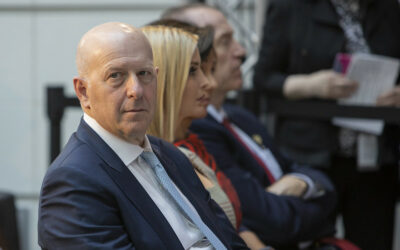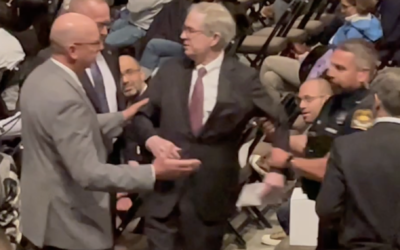The annual meeting for The Coca-Cola Company is next Tuesday, April 25, and shareholders will be asked to vote on a proposal that would increase accountability for the company’s Chairman and CEO, James Quincey (pictured above).
National Legal and Policy Center is sponsoring Proposal No. 8 on the company’s proxy statement, which requests the Board of Directors to require the two powerful roles now occupied by Quincey to be split between two individuals. NLPC argues that Quincey has inappropriately engaged the company in multiple divisive political issues that are not in the fiduciary interest of Coca-Cola or its shareholders. As an investor in the company, NLPC has filed a report to the Securities and Exchange Commission that explains its rationale for appointing an equally authoritative counterpart to keep Quincey’s left-leaning political excursions in check.
“James Quincey, invoking the name of ‘Coca-Cola,’ has repeatedly weighed in on issues like opposing the Georgia election integrity law and in support of Black Lives Matter, pointing out the alleged racial sins of America,” said Paul Chesser, director of the Corporate Integrity Project for NLPC. “His careless rhetoric only harmed the company’s reputation, since 2022 voter turnout in the Peach State elections was extremely high. Meanwhile, Quincey has highlighted Coca-Cola’s hypocrisy by doing extensive business in China, while saying nothing about the communist government’s genocide and enslavement practices.”
In its report to the SEC, NLPC points out several examples of Quincey’s leadership failures, including:
- entering Coca-Cola in a multi-company effort as co-signer of a letter that opposed plans by the Department of Health and Human Services in 2018 to restore definitions of “sex” to remove the term “identity,” for the purposes of Title IX enforcement of gender discrimination in civil rights law;
- signing the Company’s name to a 2019 letter in support of the so-called “Equality Act,” which would have added “sexual orientation” and “gender identity” to “race, color, religion, sex, or national origin” discrimination protections in the Civil Rights Act of 1964 – which would have squashed almost all other rights and freedoms Americans possess, including speech, association, privacy, and property rights;
- held mandatory “anti-racist” training in 2021 that instructed employees to try to “be less white,” which included recommendations to “be less oppressive, be less arrogant, be less certain, be less defensive, be less ignorant, be more humble, listen, believe, break with apathy, (and) break with white solidarity;”
- providing $2.5 million in grants for left-leaning organizations that included $500,000 to the Black Lives Matter Global Network Foundation, a deeply racist, anti-law enforcement organization that spent millions of dollars in corporate donations to enrich its leaders and their family members, and purchased several multi-million dollar mansions for personal use;
- engaged Coca-Cola in a multi-company letter-writing campaign to urge a “permanent legislative solution to enable (illegal immigration) ‘Dreamers’ who are currently living, working, and contributing to our communities to continue doing so” – a policy many Americans characterize as “amnesty;”
- opposed the “Heartbeat Bill” when it passed the Georgia Senate in 2019, signing a letter of objection with other businesses. The bill prohibited abortions once a fetal heartbeat is detected, with exceptions for cases that involve rape, incest, and saving the life of the mother.
NLPC’s report to the SEC also notes that since Quincey immersed Coca-Cola in controversial political issues, the company’s stock performance has lagged behind its chief competitors (like PepsiCo), when he should have been focused on his fiduciary priorities.
“Coca-Cola, like almost every company that combines the power of chairman and CEO in one person, claims they do so to maximize returns for shareholders,” Chesser said. “But the opposite is usually the case. The board needs a stronger counterpart to put the kibosh on Mr. Quincey’s political activities.”









